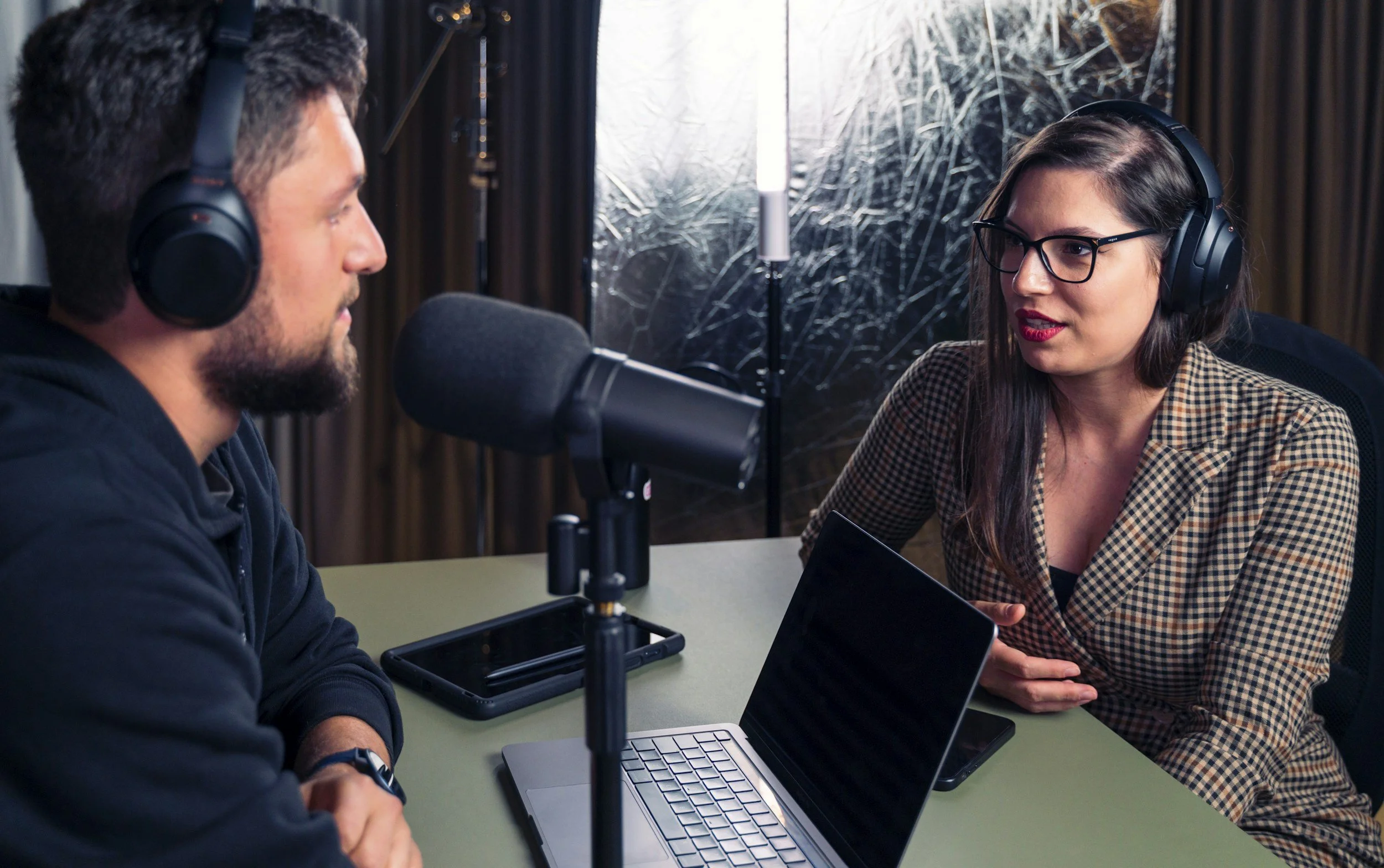Podcasts today have become not only a form of entertainment, but a tool for people to learn from experts in their field, so when it comes to B2B marketing there are so many different podcasts that can provide you with practical advice that can make a big difference in your marketing.
Having the best possible B2B marketing strategy is the goal of any company trying to optimize their reach and generate the highest quality leads. B2B marketing podcasts are an essential component of learning the latest tips and tricks to hone your strategy so that your business can continue to grow and stand out from the competition.
Many B2B leaders are finding value in launching their own podcasts. A show creates a direct line to your target audience, builds credibility in your industry, and turns conversations with the right guests into new business opportunities.
Producing a podcast consistently can be overwhelming, which is why many companies turn to a B2B podcast agency to handle everything from strategy to production, allowing them to stay focused on building relationships and growing their business.
In this expansive list of podcasts you will find plenty of useful recommendations on how to boost your B2B marketing efforts:
1. The Foundr Podcast
Hosted by Nathan ChanIf you are looking for an abundance of expert business advice from people in a wide variety of industries, The Foundr Podcast is the B2B marketing podcast for you. Listeners are able to learn from real life stories about how business leaders became successful, and the best practices and insights that they find most valuable for anyone looking to do the same, no matter what field they are in.
The guests span from modern up-and-comers who are reimagining the best ways to break into the business world, to more experienced business people who have stayed relevant in a changing marketing climate, allowing you to get an overall look at what it takes to be a founder.
2. Exit Five: B2B Marketing with Dave Gerhardt
Hosted by Dave Gerhardt
Exit Five: B2B Marketing with Dave Gerhardt is all about the best ways to drive revenue through marketing. Dave Gerhardt’s experience with B2B marketing has turned him into one of the most influential voices in the industry, making him the perfect person to help you improve through the implementation of his pro tips.
Business leaders are always interested in improving on their marketing strategies, and with the advice of not only David, but his guests, who are equally as equipped to offer tips and tricks, you can utilize this podcast’s content to your business's advantage.
3. The GaryVee Audio Experience
Hosted by Gary Vaynerchuk
With the increased focus on social media and short form video content in B2B marketing strategies, having the most up to date tips on how to optimize your content using these mediums is essential for staying relevant.
The GaryVee Audio Experience is the podcast for getting the most up to date information from an expert B2B marketer. With a main focus on business growth, you can learn not only marketing techniques to keep your business sustainable, but the best ways to keep yourself in the proper mindset to best facilitate that growth for your company.
4. Breaking B2B: B2B Marketing & Demand Generation Podcast
Hosted by Sam Dunning
When it comes to B2B marketing it can be difficult to break away from the traditional marketing and sales strategies that have become the commonplace models that many businesses fall back on when they are trying to become successful. On Breaking B2B, Sam Dunning and hisguests discuss how to be original and develop your own effective marketing strategy and avoid relying on generic, outdated techniques.
These episodes focus on how to be different and set your business apart, and span a variety of relevant topics like core marketing principles and basics, effective sales tactics and key performance metrics.
5. Hypergrowth Podcast Network
Hosted by The Drift Team
The Hypergrowth Podcast Network is a collection of podcasts where each one is dedicated to a different B2B or marketing topic. With each podcast being created by members of the team at Drift, the topics are uniquely tailored to hit every aspect of marketing that you could possibly be interested in.
With the expansive number of podcasts and hosts within the network you can take advantage of the fact that each person has a different area of expertise, along with the convenience of having one central hub as your go-to spot as a listener. The podcasts offered touch on topics ranging from business growth to optimizing customer engagement in your marketing.
6. Revenue Vitals
Hosted by Chris Walker
Revenue Vitals is a must-listen for anyone interested in B2B marketing simply because it has an entirely different approach to what the essential components of marketing success really are. As a listener you will question your entire ideology surrounding B2B marketing strategy, and further, you will learn how to improve your thought process.
One of the reasons you may have heard of this podcast before is because Chris commonly repurposes the content from his podcast episodes into short form content to reach an even larger audience.
Creating a podcast for your business can be a great marketing tool for exactly this reason, and choosing to partner with a B2B podcast agency means you can produce high-quality content that reinforces your authority, builds trust with decision-makers, and provides additional marketing assets to share across platforms like LinkedIn and social media, all without adding extra work to your plate.
7. Online Marketing Made Easy
Hosted by Amy Portfield
Online Marketing Made Easy is a podcast full of digital marketing tips that are easily accessible to anyone, even if you are just starting out. If you value easy solutions that can help with business growth, and can be implemented right away into your marketing content and strategy, then you will definitely want to give this a listen.
It’s easy to find yourself lost in a sea of technical jargon when it comes to business advice, but here you will find simplified concepts that can help you see real change in your digital marketing.
8. The B2B Playbook
Hosted by George Coudounaris
Generating leads and demand is the name of the game in regards to B2B marketing, and The B2B Playbook will provide you with a structured, easy-to-follow roadmap on how to do just that.
In this podcast host George Coudounaris and Kevin Chan explain their demand generation framework and display how effective it really is by giving examples of how it has prompted growth in revenue for real businesses.By understanding their playbook even further through in depth explorations into this framework by podcast guests as well, you can learn how it can best be applied to your business to create growth opportunities for yourself.
9. The Tim Ferriss Show
Hosted by Tim Ferriss
Tim Ferriss has cemented himself as a big name in the business world as the creator of 4 Hour Work Week, and in The Tim Ferriss Show he is able to expand on his own expertise on how to adjust your lifestyle to optimise your success.
His guests are some of the most prolific voices in marketing and entrepreneurship and they delve into things like routines, tools and habits, and explore changes that the average person can implement to truly make a difference in their lives.
10. The Notorious Thought Leader
Hosted by Erin Balsa
The Notorious Thought Leader is all about learning how to become a thought leader within your industry. It specifically focuses on how to create and optimise the thought leadership content that you are trying to create so that you are truly producing something unique and valuable that is relevant to your field, allowing you to generate more leads for your business.
If you are a business leader looking to better understand how thought leadership can contribute to keeping your business sustainable, here you will hear from company founders and marketing leaders about the real difference that a thought leadership strategy can make, and how it can set you above the competition.
11. Masters of Scale
Hosted by Reid Hoffman
If you want to learn from some of the top business leaders out there then this podcast is a must-listen. Hosted by a co-founder of LinkedIn, you will learn about business scaling from guests who have turned their companies from one small idea into a worldwide phenomenon.
With episodes featuring big names like Mark Zuckerberg, who discusses the rise of Facebook, you will gain a new perspective on what it takes to build a successful business.
12. The Customer Engagement Lab
Hosted by Travis Tyler
Learning about new marketing, sales and business growth strategies can be boring and feel repetitive when you are constantly being served the same information. If you’re looking for content that stands out and has a lighter tone, PandaDoc’s The Customer Engagement Lab is a good place to start looking for information on new marketing trends.
With a more casual format, this podcast focuses on the best ways to reach your target audience, and how to keep potential customers engaged with your content and business. Building brand awareness is important, and in B2B marketing, making sure that you are generating leads by making yourself known to others is a skill you can hone through this podcast’s many tips and tricks on how to keep people interested.
13. Noah Kagan Presents
Hosted by Noah Kagan
As the founder of Sumo and OkDork.com, Noah Kagan has a breadth of knowledge on what it means to be successful in marketing and entrepreneurship. In his podcast, he delves into topics like Search Engine Optimization and how to build strong business relationships, while also giving listeners a look into his personal life, discussing lifestyle choices that have affected him positively and could do the same for you.
14. Women in B2B Marketing
Hosted by Jane Serra
Women in B2B Marketing takes the over a decade of experience of its host Jane Serra and combines her expertise with that of other women who are prominent B2B leaders in their industries. This podcast provides you with real stories of business achievements and the marketing strategies that helped in accomplishing those goals, while also giving you insight into the best way to structure your business and about scaling for sustainability.
The discussions between accomplished women who have all risen to the top of their fields will offer you not only a critical perspective on the latest business trends, but act as a great source for inspiration as well.
15. I Love Marketing
Hosted by Joe Polish and Dean Jackson
Any up-and-coming entrepreneur looking to get into B2B marketing would benefit from listening to I Love Marketing. If you’re trying to break into your industry and are looking for a place to build a foundational knowledge of the skills that you’ll need to get your brand and content to reach your target audience, you should give this podcast a try.
One of the most important things this podcast does is give you insights into how to deal with specific situations that you are likely to face when you are just starting out in trying to build a business. This means that you can harness their marketing techniques for business growth, while also having a source to fall back on when it comes to common start-up questions.
16. The B2B Lead Gen Podcast
Hosted by Eric Schwartzman
Lead generation is a primary goal of B2B marketing, but it is important to remember that what you are really hoping to get out of your marketing is quality leads, rather than focusing on quantity, and having a lot of leads with no potential for follow-through.
The B2B Lead Gen Podcast acts as a how-to guide on generating quality leads where host (and digital marketing consultant) Eric Schwartzman goes into topics like data analysis, the hiring process, how to remain unbiased when evaluating marketing metrics, and more. Thesediscussions are all focused on teaching you how to optimize your team, and your content, for lead and revenue generation.
17. The Business of Story Podcast
Hosted by Park Howell
By listening to The Business of Story Podcast you have the opportunity to learn about how storytelling is a critical part of business through discussions with copywriters, content creators and employees who work in advertising.
Park Howell breaks down which aspects of storytelling can be applied to your marketing strategy in order to make it more effective, and you can use his ideas and the strategies of his guests to take your marketing to the next level.
18. The SaaS Marketing Show
Hosted by Dylan Hey
The SaaS Marketing Show is the perfect podcast for anyone who knows they need to make a change in their marketing strategy, but doesn’t know where to start.
Here you can find a wide range of case studies on real businesses who have become successful, but instead of focusing solely on what they did right, this podcast goes into the missteps as well, helping you to better evaluate your own business practices and make changes according to what has and hasn’t worked for other businesses.
19. Growth Marketing Stories
Hosted by Aazar Ali Shad
Growth Marketing Stories is a podcast all about how you should take a growth flywheel approach to your B2B marketing in order to build momentum and continue to grow long term, instead of relying on techniques that work for short term revenue, but leave you at square one later on.
By listening to this podcast you will learn why keeping your target audience engaged in your brand by providing them with new and exciting content that they specifically find valuable works to your advantage long term, because your potential customers will keep coming back to you if they consider your content useful.
20. The Science of Social Media
Hosted by Hailley Griffis, Brian Peters and Kevan Lee
With the rise of social media as a core B2B marketing tool, understanding how to optimize your business’s presence on these platforms is more important than ever. The Science of Social Media allows you to learn through not only the interview format, but also through in depth discussions that actually teach you social media techniques used by big brands to keep their audience engaged in short form content.
Conclusion
It is clear that B2B podcasts offer a true wealth of information for any business looking to improve their marketing strategy. The convenience and affordability of podcasts makes them a resource every business leader should take advantage of, because there is really no opportunity like them to learn from the expertise of such a wide variety of marketing professionals.
Have you implemented any of these podcasts’ marketing strategies at your company? If so, let me know, which did you find most effective?
Written by Eva Geimer
-
Jony Studios is a content marketing agency specializing in B2B podcasting and audiobook services. They have worked with many clients, from startups to larger organizations such as Penguin Random House, Amazon, University of Waterloo, Freakonomics Radio, and many others.













